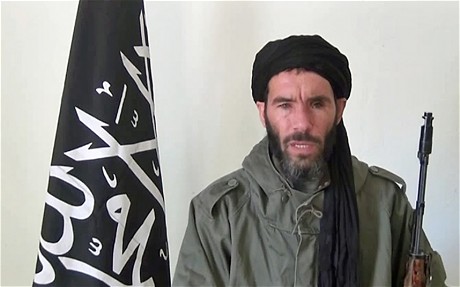
BRIEFS
Publication: Terrorism Monitor Volume: 12 Issue: 10
By:

ALGERIA FIGHTING A TWO-FRONT WAR WITH ISLAMIST MILITANTS
Andrew McGregor
The continuing break-up of al-Qaeda in the Islamic Maghreb (AQIM) into northern and southern factions under rival commanders Abd al-Malik Droukdel and Mokhtar Belmokhtar has presented Algerian authorities with the necessity of fighting a two-front war against factions interested in establishing their dominance by striking security targets within the country.
Algerian security operations along the border with the Kidal region of northern Mali led to the death of a dozen Islamist militants in the southern Tamanrasset region (Algeria’s 6th military district). The May 5 military operation by the Algerian Armée nationale populaire (ANP) took place in the Taoundert Commune, some 80 kilometers west of the border town of Tin-Zaouatine, a regional smuggling center. Recently re-elected Algerian president Abd al-Aziz Bouteflika later claimed that the group of 20 to 30 militants were attempting to infiltrate Algeria and included elements from Mali, Libya and Tunisia, though its exact destination and purpose remain unknown (Reuters, May 7).
The operation provided some measure of revenge for the ANP after at least 11 Algerian soldiers were killed in an ambush carried out by AQIM on a military convoy in the mountainous Tizi Ouzou region east of Algiers (Algeria’s 1st military district) on April 19 (BBC, April 20). The troops were returning to base after having secured polling stations in Tizi Ouzou for the presidential election.
According to Algerian security sources, much of the seized weaponry was traced to Libyan military stocks looted by NATO-backed Libyan rebels in 2011. Arms and other materiel recovered after the clash included Kalashnikov assault rifles, anti-tank mines, mobile phones, three all-terrain vehicles, two motorcycles, satellite phones, GPS equipment, solar plates, grenades, a grenade launcher and a shotgun (Echorouk [Algiers], May 5). [1]
At roughly the same time, security forces in the Djanet district (Algeria’s 4th military district) close to the border with southwestern Libya uncovered another cache of what appeared to be weapons looted from Libyan armories, including 87 Russian S-5KO rockets, a relatively inaccurate Russian-made rocket designed for use by aircraft and helicopters but re-adapted for use from a truck bed or a MANPAD system in Libya (Algeria Press Service, May 6). Found buried in the sand with the rockets was an improvised rocket launcher (al-Watan [Algiers], May 7). A further gun battle near Tin Zaouatine resulted in the death of two militants, bringing the death toll up to 12 (Naharnet.com, May 12).
The April 30 pledge of allegiance by Mokhtar Belmokhtar (a.k.a. Khalid Abu al-Abbas) to al-Qaeda leader Ayman al-Zawahiri (in which Belmokhtar called al-Zawahiri “our Amir”) and his recognition of the legacy of Osama bin Laden and Abdullah Azzam appears to be yet another demonstration of his rejection of the leadership of AQIM leader Abd al-Malik Droukdel (AFP, May 1). At the moment, Droukdel’s AQIM and Belmokhtar’s Libyan-based al-Murabitun movement seem to be engaged in a bitter rivalry, though so far their contest is being carried out through attacks on Algerian targets rather than group-on-group clashes like those witnessed between the Islamic State of Iraq and Syria (ISIS) and the al-Qaeda sponsored al-Nusra Front in Syria. With Droukdel’s faction operating in northern Algeria and Belmokhtar’s faction operating in the remote south, such inter-Islamist clashes appear unlikely in Algeria.
Though the United States has opened the possibility of supplying Algeria with surveillance drones to help monitor the vast desert wilderness of southern Algeria, it has refused to supply Algeria (or other nations, for that matter) with attack drones of the type deployed by the CIA and the U.S. Department of Defense (al-Jazeera, May 9). Meanwhile, Algeria has denied a U.S. proposal delivered by Secretary of State John Kerry to set up a base for drone operations in southern Algeria (al-Jazeera, May 11).
Note
1. Ministère de la Defense Nationale d’Algérie: “Neutralisation de terroristes à Tamanrasset / Bilan de l’opération,” May 6, 2014, https://www.mdn.dz/site_principal/index.php?L=fr#terro06052014.
PLAN TO SHIP ISRAELI GAS TO EGYPT RAISES POLITICAL AND SECURITY CONCERNS
Andrew McGregor
Only two years after public opposition and attacks by militants brought an end to Egyptian gas shipments to Israel, there is a new proposal to begin shipping Israeli natural gas to Egypt. Texas-based Noble Energy signed a non-binding letter of intent with Unión Fenosa Gas (UFG – a Spanish-Italian joint venture) on May 5 calling for the shipment of 2.5 trillion cubic feet of natural gas from Israel’s offshore Tamar gas field over 15 years. The gas would be liquefied for export at Unión Fenosa’s Damietta liquefied natural gas (LNG) plant (20 percent owned by Egypt) before shipment to foreign markets by tanker, though the Egyptian government announced two days later that it had not yet issued the necessary authorization required for any imports of gas from Israel. Egypt’s Oil Ministry has said that any such deal would need to “serve the national interest of the country” (Wall Street Journal, May 6; Haaretz/Reuters, May 7).
The Tamar gas field is located 50 miles off the Israeli coast in the waters of the eastern Mediterranean and began production in March 2013. The largest partner in developing the gas field is Noble Energy, with a 36 percent share. Other partners include Israel’s Isramco Negev 2, two subsidiaries of Israel’s Delek Group and a subsidiary of Israel’s Dor Alon Group. The Tamar partners have already signed smaller deals to supply gas to the Palestinian Authority and Jordan’s Arab Potash Company and Jordan Bromine Company but have otherwise failed to find international markets for Tamar’s production. Turkey remains a potential customer for Tamar gas, but any deal with Turkish energy firms would come with its own political baggage given the strained relations between Turkey and Israel.
Leviathan, a second Israeli offshore gas field, is owned by the same partners as the Tamar field. With twice as much gas reserves as Tamar, Leviathan is expected to go online in 2017 though financing has yet to be arranged due to the absence of large, long-term contracts with buyers. The Leviathan partners are expected to announce an export deal with foreign partners within three months. Tamar and Leviathan are expected to meet Israel’s domestic energy needs for at least the next 25 years.
The last natural gas deal between Egypt and Israel ended badly, with both parties entering arbitration before the International Chamber of Commerce (ICC) this year to resolve outstanding financial claims. In this earlier case, natural gas exports from Egypt to Israel were repeatedly interrupted by attacks by militants on the al-Arish to Ashkelon pipeline. The attacks began shortly after the January 2011 overthrow of President Hosni Mubarak and continued even after the Egyptian General Petroleum Corporation (EGPC) and the Egyptian Natural Gas Holding Company (EGAS) terminated their agreement with Israel’s East Mediterranean Gas (EMG) over a payment dispute following an Egyptian declaration of force majeure they claimed would excuse them from meeting their supply obligations. [1] By this time, there was massive popular opposition to continuing a deal to supply Israel with gas at below market prices that many Egyptians viewed as a prime example of the corruption that permeated the Mubarak regime.
There has been some discussion of using the existing pipeline to carry Israeli gas to Egypt until a proposed undersea Tamar to Damietta pipeline has been completed, though it seems likely the pipeline would again be the target of Bedouin and Islamist militants operating in the Sinai (al-Jazeera, May 8). Residual anger over this earlier contract is likely to help generate opposition to any new Egyptian gas project involving Israel. However, if the deal goes through, militants will have much greater difficulty interrupting the submarine pipeline than the exposed pipeline running through the Sinai Peninsula.
Egypt is trying to deal with severe energy shortages during a politically sensitive time. Natural gas is used to generate most of the nation’s electricity and blackouts have become common since the 2011 revolution. With steadily diminishing production and an inability to attract sufficient investment to develop remaining reserves, Egypt is finding it impossible to meet both heavily subsidized domestic demand and its export commitments (Reuters, May 6; al-Bawaba, May 7). Several gas-producing Gulf nations supporting Egypt’s political transition have supplied Egypt with $6 billion in free fuel to ward off potential popular unrest created by energy shortages this summer (Reuters, May 6).
With Egyptian natural gas now being diverted to the domestic market, UFG’s Damietta plant has been offline since December 2012 (al-Jazeera, May 8). A second Egyptian LNG plant located at the Mediterranean port of Idko is operated by the British-owned BG Group, the losing bidder on the Tamar gas deal. Like the Damietta plant, the Idko plant is also running well below capacity due to supply shortages and was unable to export any gas during the first quarter of 2014. The Egyptian government’s decision to divert natural gas supplies to the domestic market is estimated to have cost Unión Fenosa and the BG Group billions of dollars in lost revenue and has prevented both firms from meeting their commitments to customers in Europe and Asia.
Following the U.S. imposition of sanctions on Russia, European countries dependent on Russian gas imports are now seeking alternative supplies, mainly from nearby Algeria. After Egyptian negotiations with Algeria’s government-owned Sonatrach were halted when European markets began expressing interest in Algerian gas following the Crimea crisis, Egypt turned to Russia’s Gazprom Company for supply, reaching an agreement to import Russian liquefied natural gas beginning this summer (Daily News Egypt, May 13). The favorable payment terms offered by Russia may be viewed as part of its effort to re-establish influence in Egypt and other parts of the Middle East.
It remains uncertain whether any of the Israeli gas exported to Egypt would find its way to gas-hungry Egyptian markets or what the reaction of the Egyptian public might be to such a development. In the meantime, Unión Fenosa has brought its own complaint before the ICC over the Egyptian failure to maintain contracted payments as per its agreement and it is possible the BG Group will follow suit with reference to Egypt’s failure to supply its Idko LNG facility with natural gas. The BG Group has already declared force majeure for its Egyptian operations because of the government’s gas diversions and a $4 billion debt owed by the Egyptian government. Egypt has already faced 19 arbitration cases from international energy firms since the 2011 revolution, with most of these remaining unsettled. In the meantime, factories, businesses and retailers are all forced to reduce their hours of operation, damaging an already struggling economy. Alternatives to gas are being sought to supply Egypt’s energy needs as the high consumption summer months approach, including the use of coal and low-grade polluting petroleum products (Zawya [Dubai], April 15).
Note
1. Force Majeure refers to a party to a contract being relieved of their obligation to fulfill terms of a contract due an event or circumstance beyond the control of the party concerned that has resulted in the party failing or delaying its contractual obligations in circumstances that could not be prevented or overcome by the standard of a reasonable or prudent person or party. It excludes such relief (normally intended to be only temporary) in cases of negligence or malfeasance.





